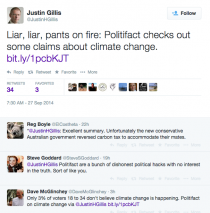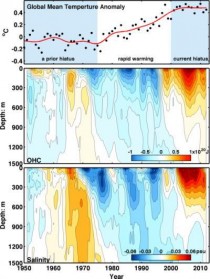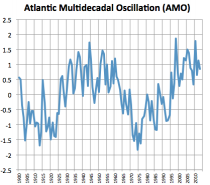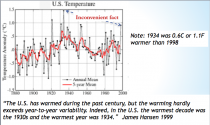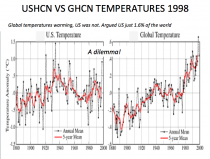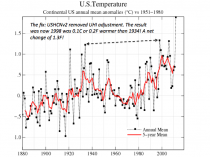By Joseph D’Aleo, CCM
Gillis points to Politifacts story as “justinification’ of his blind allegiance to all aspects of AGW. Steve Goddard in his comment has it right. The last comment actually is interesting claiming only 3% of the public doesn’t believe the climate is changing. Actually, there is not a skeptic I know that does not believe climate is changing, always has, always will.
In the Tampa Bay Times, Politfacts tackles 10 questions in a very weak analysis. I give them an F for effort and accuracy.
I will only touch on two items. These are their claims:
5. Surface temperatures on Earth “have stabilized.” -Mostly False.
Sen. Marco Rubio, R-Fla., has repeatedly questioned the need for proposals that address climate change, but he often tries to do it without sounding anti-science.
In an interview on Fox News in May, Rubio said he never denied that the climate was changing, but he also said that “the left loves to go around saying there is a consensus” when there is no consensus on the sensitivity of the climate, “which is why, despite 17 years of dramatic increases in carbon production by humans, surface temperatures (on) the earth have stabilized.”
Rubio has a point that over roughly the past 15 years, global surface temperatures have plateaued, particularly compared to their rapid rise in previous decades. But scientists we interviewed said the evidence suggests that the pause is temporary, with temperatures poised to rise once the oceans start releasing more heat. We rated Rubio’s claim Mostly False.
REPLY
Yes that was one of 52 excuses for the pause but where is the proof the oceans are hiding the heat? From the University of Washington and the department of Trenberth’s missing heat comes a claim that we’ll have to wait another 15 years for global warming to resume. Sounds like a goalpost mover to me.
The Oceans that Slowed 21st Century Global Warming
Why did the rapid global warming that characterized the latter part of the 20th century slow down over the last 15 years or so? Many different theories have been proposed, but a new study suggests that a massive movement of heat from shallow surface waters to deep regions of the Atlantic and Southern Oceans - but not the Pacific Ocean, as many researchers had predicted - might be responsible. Xianyao Chen and Ka-Kit Tung analyzed data from profiling floats, or oceanographic sensors that can move vertically throughout the water column, and traced the pathways that heat has taken through the world’s oceans since the turn of the 21st century. The oceans are capable of storing about 90% of the world’s surface heat content, and the researchers suggest that most of the excess heat that would have otherwise continued to fuel global warming is currently stored in the basins of the Atlantic and Southern Oceans.
Atlantic Ocean heat Content.
The Atlantic is in its warm phase of the 60-70 year AMO. It explains the increased heat since 1995. When it reenters the cold mode it will accelerate the cooling.
6. “NASA scientists fudged the numbers to make 1998 the hottest year to overstate the extent of global warming.” - Pants on Fire.
Fox News host Steve Doocy repeated something that’s been all over the Internet: the claim that scientists have fixed numbers to make 1998 the hottest year.
PunditFact found that scientists have adjusted historical data to account for weather stations that have moved or when temperatures were recorded at different times of day. That’s hardly the same thing as fudging the numbers in pursuit of a political agenda. We rated Doocy’s statement Pants on Fire.
REPLY: Doocy’s got it right. Politifacts response if more like Liberal Hair on Fire.
In 1999, NOAA and NASA reported 1998 was 1.1F cooler than 1934. Hansen admitted the 1930s was the warmest decade and 1934 the warmest year. See his quote in the image.
This US data set, though initially widely regarded as the world’s best because it was stable and had adjustments for urbanization contamination. But it was at odds with the global data set which did not have the same stability or adjustments.
In 2008 under pressure, NOAA redid the data set, removing the urban adjustment.
The result is that a 1998 that was 1.1F cooler than 1934 in 1998 became 0.2F warmer, a 1.3F change. I would regard that as fudging the data in pursuit of a political agenda so Doocy was right on.
Brought Down By Good Intentions
I’ve warned you many times that our power grid is unstable. The infrastructure is old. The security protecting the grid is porous. The amount of power it is able to supply is just barely outstrips the demands we place on it.
And demand is growing, while supply is being deliberately hampered. In the coming years, you’ll see my predictions begin to take shape. The grid is going to become more unreliable. More unstable.
And prices are going to go up. You read that right. You’re going to pay more for a lower quality product.
You can thank green energy policies for this unfortunate turn of events.
Government Attacks 86% Of Our Power Supply
Lets look at some basic facts.
Power companies meet demand by tapping into power plants to supply electricity when people need it. To do this, they count on plants to be able to provide more energy at a moment’s notice. As demand shifts, so does the supply of power running through the grid.
The types of power plants that have the capability to quickly adjust to meet swings in demand are natural gas, coal powered, hydroelectric, and nuclear. Currently these types of plants provide more than 86% of the nation’s power needs. And for the most part - despite the shortcomings of our grid infrastructure - they do a reliable job.
Unfortunately, the EPA has other ideas.
The EPA keeps passing regulations to “improve” coal-fired power plants. These regulations, on the surface, are meant to force coal-fired power plants to become cleaner energy producers. What these regulations are really doing is forcing coal-fired power plants to shut down. And they’re also preventing new plants from opening.
The EPA - an arm of the executive branch of government - is responsible for policies that may force 40% of the nation’s power generation to come to a standstill. In any other country, such a policy would be ludicrous.
The EPA also has it in for natural gas power plants. And there are plenty of activists out there trying to shut down hydroelectric dams and nuclear power facilities, too.
Storms… disasters… terrorism… rolling blackouts…
There are so many ugly threats in our world that we can’t control. And have you noticed lately the rising level of social madness that is welling up out there? Well, don’t worry = you are not alone in realizing that you need to have a plan. A way to leave >> See what they’re doing to prepare here
‘I guarantee you if wind power ever got to be efficient at producing energy, it would become the target of the government, the environmentalists, or both.’ That’s because these folks aren’t pro-earth. They are anti-energy.
Anti-Energy Environmentalist Want to Send You Back to Pre-Industrial Living
Just look at the power sources that environmentalists and EPA bureaucrats do support. Wind and solar. But these alternatives aren’t practical. They don’t provide the kind of reliable flow of power that the grid demands.
Wind and solar are intermittent and unreliable. They cannot sustain the grid. In fact, they put it at higher risk. When wind and solar power are tied into the grid, power companies have to depend on coal and natural gas plants for back up when the wind isn’t blowing or when the day is overcast. This forces normally reliable power producers to constantly adjust their supply to match the unpredictable shortfalls created by green energy sources.
Yet, the government subsidizes production of both wind and solar power, even though combined, they provide just 4% of our power.
Our Grid is In Danger
Setting impossible-to-meet regulations on reliable power sources while subsidizing green energy sources that disrupt the grid more than they enhance it is a crazy policy. More than that, it’s dangerous. These bad government policies have the potential to collapse the grid.
It puts average citizens like you and me in a bad position. The current administration - which is supposed to protect our national interests - seems determined to do as much damage to the power grid as possible. The best-case scenario, like I said at the beginning of this article, is higher prices and lower reliability. The worst-case scenario is no power at all.
Solar storms and terrorist attacks are very real threats to our power grid, but the biggest threat of all is our government.
I urge you to take three steps toward greater personal energy independence, starting today.
First, take stock of the most important things you use power for. If you had to go without power, what would be the hardest things for you and your family to live without?
Second, begin planning a back-up system for those things.
And third, contact your representatives in Congress. Tell them you support a smart energy policy based on coal, natural gas, and other reliable power sources and you expect them to do the same.
The Obama administration is as anti-energy as any I’ve seen. And only time will tell the extent of the damage this administration has done to our power grid. Preparing for the worst, at this point, is just prudent.
P.S. With our power grid in such fragile shape, any number of threats could deliver a crippling blow, leaving the nation in the dark. Let me show you the list of essentials you need to withstand any emergency situation.
BY E. CALVIN BEISNER , CP OP-ED CONTRIBUTOR
Climate change: The greatest challenge facing humanity? A manageable problem? Just par for the course on a planet whose climate has always changed?
What should we do about it? Indeed, what can we do about it?
Would drastic cuts in carbon dioxide (CO2) emissions save the world from disaster, or make no significant difference in future climate? Would the cuts cost little, or condemn much of the world to more generations of abject poverty, disease, and premature death?
Are wind, solar, and other alternatives to coal, oil, and natural gas as abundant, affordable, and reliable, or would switching to them drive up energy prices and cause costly and dangerous brownouts and blackouts?
Whose opinions about climate change, and climate policy, matter?
Some climate scientists, associated with the U.N. Intergovernmental Panel on Climate Change, who publish dire warnings of catastrophe, say only their opinions count. But what about other climate scientists, including those with the Nongovernmental International Panel on Climate Change, plus more, who think human contribution to climate change is relatively small and not dangerous?
How about economists, who understand the economic impact of proposed climate policies? Or energy engineers, who understand the challenges of providing, abundant, affordable, reliable energy, without which societies cannot climb or stay out of poverty? Or political scientists, who study the impact of environmental regulations on liberty?
How about theologians and philosophers, who can speak to the philosophy of science and the ethics of policy to questions of justice and charity, of human life and dignity, of rights and responsibilities? Or pastors, aid workers, and others who deal with people in need - the elderly, the poor, and others who are hardest hit, whether by changing climate or by policies meant to address it?
And what about ordinary citizens, whose lives will be influenced by climate change, whether it’s largely manmade or natural, and by policies meant to respond to it, whether by trying to prevent it, or by adapting to it? It’s ordinary people, after all, who pay utility bills affected by energy policies driven by climate concerns.
Climate change and climate policy are among the most complex issues humanity encounters. No group - not even climate scientists - should have a monopoly on advising policymakers about them. Instead, this multifaceted challenge requires input from thinkers of many backgrounds.
A network of Christian theologians, scientists, economists, and other scholars believes people of all these backgrounds and more are stakeholders in the decisions facing America and other nations around the world. They can have well-informed opinions on climate change and climate policy, and they deserve to be heard by policymakers.
The Cornwall Alliance for the Stewardship of Creation, which I lead, has issued a declaration, Protect the Poor: Ten Reasons to Oppose Harmful Climate Change Policies, signed by over 140 individuals so far. Nearly 50 scientists, including 21 climate scientists, are among the signers, along with 21 economists, including specialists in environmental economics; 48 theologians, philosophers, and pastors; 29 ministry leaders, and 10 media figures who believe today’s climate change policies will hurt society’s most vulnerable.
The 21 climate scientists among signers are particularly significant. Last year, an opposing group published a statement that some people, including a reporter for the prestigious ClimateWire, a publication of Energy & Environment Publishing, Inc., took to have been endorsed by nearly 200 evangelical climate scientists; it turned that only 5 (2.6%) were climate scientists.
Among 20 climate scientists endorsing the declaration are Joseph D’Aleo, co-founder of The Weather Channel and chief meteorologist of weatherbell.com and Icecap.us; Neil L. Frank, former Director, National Hurricane Center; and Roy W. Spencer, Principal Research Scientist in Climatology at the University of Alabama and an award-winning NASA climate researcher. Economists include Kenneth Chilton, Founder and Senior Environmental Fellow, Center for Economics & the Environment, Lindenwood University; George Gilder, author of Knowledge and Power: The Information Theory of Capitalism and How it is Revolutionizing our World; and Shawn Ritenour, Professor of Economics, Grove City College. Theologians, philosophers, and pastors include Bradley G. Green, Associate Professor of Christian Thought and Tradition, Union University; Henry Krabbendam, Emeritus Professor of Biblical Studies, Covenant College, and President of Africa Christian Training Institute, Uganda; and Jeffrey Riley, Professor of Ethics, New Orleans Baptist Theological Seminary.
The declaration is backed by a new study, A Call to Truth, Prudence, and Protection of the Poor 2014: The Case against Harmful Climate Policies Gets Stronger, written by two outstanding scholars, Dr. David R. Legates, Professor of Climatology at the University of Delaware, and Dr. G. Cornelis van Kooten, Professor of Economics and Research Chair in Environmental Studies and Climate at the University of Victoria, in British Columbia. I provided an introduction from the perspective of a theologian and ethicist concerned about the impact of climate policies on the world’s poor.
Both the declaration and the study are available on the Cornwall Alliance’s website, www.CornwallAlliance.org.
Summarizing some of the study’s findings, the declaration states that Earth’s climate system is robust, resilient, and self-correcting, reducing rather than magnifying the impact of added CO2 to the atmosphere, and that natural cycles outweigh human influence global temperature.
It points out that computer climate models, on which predictions of dangerous warming rest, have been falsified by real-world observations, which show CO2-driven warming to be far less than expected, and thus far less dangerous, possibly even mostly beneficial. And aside from its minuscule effect on temperature, “Rising atmospheric CO2 benefits all life on Earth by improving plant growth and crop yields, making food more abundant and affordable, helping the poor most of all.”
It goes on to say:
Abundant, affordable, reliable energy, most of it now and in the foreseeable future provided by burning fossil fuels, which are the primary source of CO2 emissions, is indispensable to lifting and keeping people out of poverty. Mandatory reductions in CO2 emissions, pursued to prevent dangerous global warming, would have little or no discernible impact on global temperatures, but would greatly increase the price of energy and therefore of everything else. Such policies would put more people at greater risk than the warming they are intended to prevent, because they would slow, stop, or even reverse the economic growth that enables people to adapt to all climates. They would also harm the poor more than the wealthy, and would harm them more than the small amount of warming they might prevent.
“[B]illions of the poor desperately need to replace dirty, inefficient cooking and heating fuels, pollution from which causes hundreds of millions of illnesses and about 4 million premature deaths every year, mostly among women and young children,” the declaration says. “To demand that they forgo the use of inexpensive fossil fuels and depend on expensive wind, solar, and other ‘Green’ fuels to meet that need is to condemn them to more generations of poverty and the high rates of disease and premature death that accompany it.”
The declaration’s signers call on:
“Christians to practice creation stewardship out of love for God and love for our neighbors - especially the poor”;
“Christian leaders to study the issues and embrace sound scientific, economic, and ethical thinking on creation stewardship, particularly climate change”; and on
“Political leaders to abandon fruitless and harmful policies to control global temperature and instead adopt policies that simultaneously reflect responsible environmental stewardship, make energy and all its benefits more affordable, and so free the poor to rise out of poverty.”
The war on fossil fuels is, in the end, a war on the poor. It’s time to end it.



